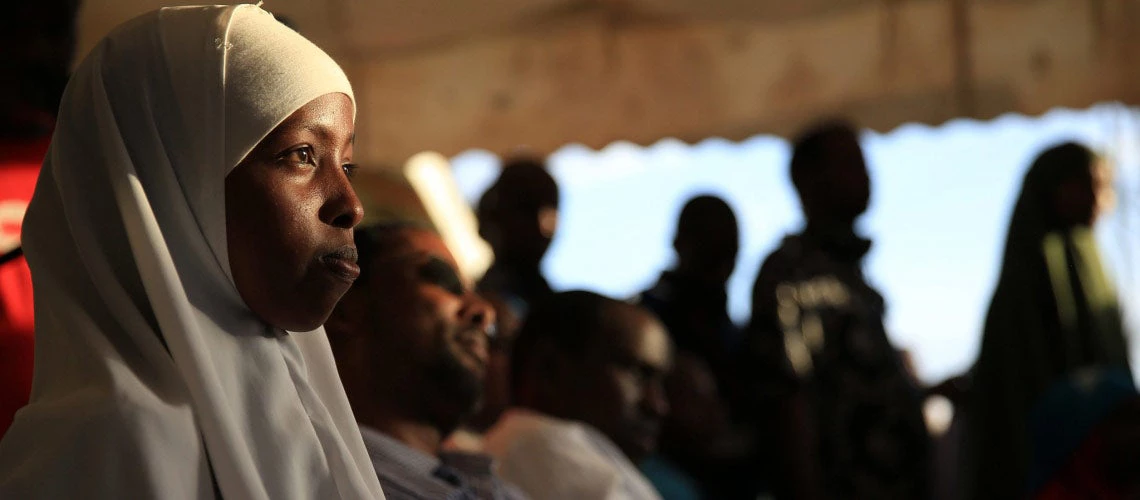 Photo © Dominic Chavez/World Bank
Photo © Dominic Chavez/World Bank
Globally, we are facing the worst forced displacement crisis since World War II. More than 79 million people have been forcibly displaced around the world due to conflict, including 26 million refugees, according to the latest annual figures from the UN High Commissioner for Refugees.
This displacement can have devastating socio-economic consequences, with refugees often facing impacts on health, lost education opportunities, and securing work and housing, among other challenges. For example, one study from Kenya found that both host communities and refugees were among the worst off in the country in terms of poverty and associated socioeconomic indicators. More than half of refugees (58%) were unemployed and one-third likely to be ‘deprived’ or ‘severely deprived’ in respect to education, health and living standards.
More than 79 million people have been forcibly displaced around the world due to conflict, including 26 million refugees.
I saw this firsthand earlier this year when I traveled across the Sahel region from Mali to Burkina Faso to Niger to Mauritania. At the time, the region was grappling with a huge crisis of forced displacement, with 1,000,000 internally displaced people and 165,000 refugees. During my travels, I met many people who shared a common concern – the increasing violence and deteriorating security situation in the Sahel region, and its severe impact on communities, societies and economies.
What is often missing in the headlines about refugees however, is that 82 percent of all refugees are hosted by developing countries – and three quarters are still displaced after five years. Refugees often settle into host communities which are among the poorest in their countries or in remote or border areas, where residents are already struggling to obtain jobs and adequate public services.
Refugees often settle into host communities which are among the poorest in their countries or in remote or border areas, where residents are already struggling to obtain jobs and adequate public services.
The responsibility of these host countries is large and growing – and this has only intensified during the COVID-19 (coronavirus) pandemic. The economic and social impacts are likely to affect both refugees and host communities in developing countries, exacerbating their pre-existing vulnerability and dependence on overstretched humanitarian assistance.
Despite this, host countries continue to provide protection, shelter, health care, education, and livelihood support for refugees and the communities that host them. Their approach exemplifies the vision set forward in the Global Compact on Refugees.
How can we support these urgent needs for host communities and the refugee communities they’ve taken in?
Starting next month, the World Bank’s fund for the poorest countries – IDA – will provide $2.2 billion over three years in support of host communities and refugees. This comes on top of the $1.5 billion investment over the last three years supporting 32 World Bank operations in 14 low-income countries that host refugees.
Uganda, Africa’s largest hosting country, has long welcomed and hosted over a million refugees from the region, with an open-door refugee policy and practices. The World Bank, through a comprehensive forced displacement program, has facilitated the country’s delivery of essential social services and economic opportunities for refugees and host communities, for example through the Development Response to Displacement Impacts Project (DRDIP). Support for the national response plans for refugees and host communities helps the government deliver health, education, water, and environmental services to refugees.
Ethiopia, Africa’s second largest hosting country has around 730,000 refugees from Eritrea, Somalia, South Sudan and Sudan. It passed a revised Refugee Proclamation in 2019 that gives refugees a pathway to live outside of camps, work in the formal sector, and access national health and education services. To help implement the government’s policies, the World Bank has provided over $200 million to support economic opportunities for refugees and host communities. We’re now developing a program to help refugee children enter and succeed in national schools.
In Bangladesh, we are supporting the government and UN agencies for surveillance, testing, infection prevention and control as well as community engagement and communication efforts around COVID 19, focusing on refugees and host communities in Cox’s Bazar.
But this isn’t just about low income countries. Colombia, for example, has welcomed more than 1.8 million Venezuelan migrants and refugees into its communities over the last few years. Colombia’s government has progressively regularized the legal status of many Venezuelans, enabling them to enter the labor market and access education and health services. This includes guaranteed health care access for Venezuelan migrants who have COVID-19 or might be infected – the same care provided to any Colombian citizen. Together with the Global Concessional Financing Facility (GCFF), the World Bank has helped the government meet these needs. We have supported development and implementation of a medium-term policy framework for response, as well as new health and housing programs for migrants and host communities, along with hands-on advice and technical assistance.
Country-led efforts like these are central to the World Bank Group’s efforts to ensure better integration of refugees into host communities and longer-term investments in both refugees and their hosts. This is central to our goals of ending extreme poverty and boosting shared prosperity and complements the tremendous work of humanitarian institutions like UNHCR. It’s also in line with our recently released five-year strategy for Fragility, Conflict, and Violence, which commits us to helping countries address both the drivers and impacts of conflict.
COVID-19 makes these investments even more urgent. Already, our emergency support in several countries – including Burkina Faso, the Central African Republic, Chad, Lebanon, Mali, Myanmar, Niger, and South Sudan – is available to support to migrant, refugee and internally displaced populations within these countries, along with support for host communities. Looking ahead, the IDA Window for Host Communities and Refugees will make available up to $1 billion in grants for COVID-19 response; these operations will benefit refugees and host communities through the middle of 2021.
On this World Refugee Day, it’s especially important to acknowledge and support the enormous efforts of developing countries that are hosting refugees.
On this World Refugee Day, it’s especially important to acknowledge and support the enormous efforts of developing countries that are hosting refugees. At the World Bank Group, we are stepping up and doing all we can to help these countries respond to the health emergency posed by COVID-19, contain the economic damage, and start planning for long-term recovery. The protection and well-being of refugees depends on this support now more than ever.
RELATED
The World Bank Group and COVID-19
World Bank Group Strategy for Fragility, Conflict, and Violence 2020-2025


Join the Conversation